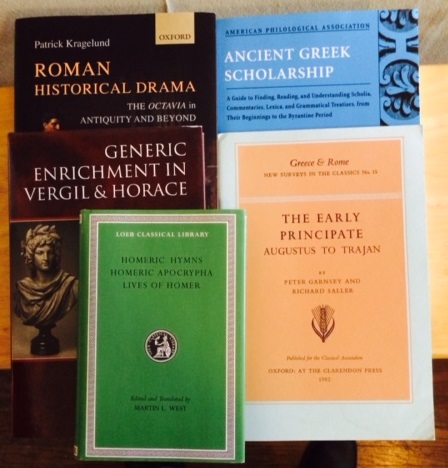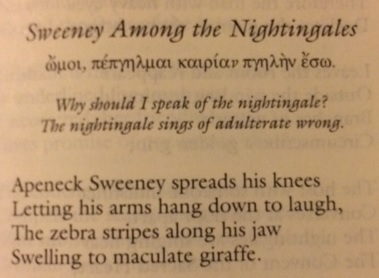Martial describes a selfish rich man’s estate (12.50):(1)
Daphnonas, platanonas et aerios pityonas
et non unius balnea solus habes,
et tibi centenis stat porticus alta columnis,
calcatusque tuo sub pede lucet onyx,
pulvereumque fugax hippodromon ungula plaudit,
et pereuntis aquae fluctus ubique sonat;
atria longa patent. sed nec cenantibus usquam
nec somno locus est. quam bene non habitas!
1 pityonas Heinsius : pyt(h)onas β : phyonas T : cyparissos γ
You are sole proprietor of plantations – laurel, plane, and airy pine – and baths not made for one; for you stands a lofty portico with a hundred columns, and alabaster gleams trodden under your foot; the swift hoof strikes the dusty hippodrome and everywhere sounds the flow of water going to waste, halls stretch at length. But there’s nowhere a place to dine or to sleep. How well you are – not lodged!
Once Heinsius had extracted pityonas from the chaos of the manuscripts in line 1, there seemed to be no textual problems remaining in this ornately Hellenic but otherwise straightforward epigram.(2) However, it seems to me that line 2 is a problem, in two interrelated ways.
1. The other possessions listed in the first six-and-a-half lines are quite grand. Having a bathtub large enough for more than one bather is not impressive, at least by ancient Roman standards.(3) Everyone seems to have bathed in groups, at home if they could afford their own private baths, at the public balnea or thermae if they could not. If I’m not mistaken, there’s far less evidence for ‘one-seater’ bathtubs than for larger baths in the ancient world. The only one I’ve run across in my own reading is in Velleius Paterculus 2.114.2, and I assume it’s a one-seater partly from the name (solium also means throne), partly from the fact that Tiberius takes it on campaign, though he kindly lends it out for the use of sick soldiers. A portable military bathtub is hardly relevant to the plutocrat of this poem.
2. Worse, the line ruins the climax by revealing the secret much too soon. As Stevenson explains it: “2. non unius, baths, far exceeding the wants of one man, with an allusion to his inviting no guests”.(4) But the allusion is unwanted. That the unnamed addressee has no guests, and no friends, should come as a surprise in the last couplet, pleasant or unpleasant as the case may be, as we lean more towards admiration of Martial’s cruel wit or disgust at the target’s monumental selfishness. There is no other hint of the final twist before the big ‘but’ (sed) in the middle of line 7.(5)
Both problems can be removed with a truly minimal conjecture: the deletion of a single pen-stroke. Martial’s patron the younger Pliny writes of rich men’s bedrooms (2.17.8, 13) and dining rooms (1.3.1, with my conjecture) designed to catch the sun from different angles at different times of day. A bathhouse similarly disposed would be a luxury in a class with a private hippodrome, multiple groves, and the rest. If this man had such a bathhouse, would Martial have described it as non unius balnea solis, ‘a bathhouse of more than one sun’? He uses a similar phrase in 10.51.9, where a bedroom overlooking the sea and a river from different windows is described:
. . . non unius spectator lectulus undae,
qui videt hinc puppes fluminis, inde maris!
Of course, a river (or canal: Friedländer) and the sea are ‘more than one body of water’ in a much more literal way than our single sun can be ‘more than one sun’. Still, Martial uses the plural of sol in a wide range of meanings, including sunny days (Baiani soles, 6.43.5) and sunlight shining through glass (8:14.3-4):
hibernis obiecta Notis specularia puros
admittunt soles et sine faece diem.
My conjectural text would be arguably bolder than either of those, but solves the problems out-lined above in (I would say – though I’m prejudiced) an admirably poetical way.
(1) I quote Shackleton Bailey’s Teubner text and apparatus (1990), along with his Loeb translation (1993). It is odd that the addressee lacks the usual semi-random pseudonym.
(2) And only one exegetical: pereuntis (6) has puzzled interpreters enough that Shackleton Bailey gives it a note in his apparatus, though that does not affect my argument.
(3) Even today, a home jacuzzi or in-ground swimming pool does not always put one in the top 1% of the income distribution, much less in the top 0.01%, as this man’s other possessions imply.
(4) H. M. Stephenson, Selected Epigrams of Martial (1880). Another difficulty is that non unius means “more than one”, which includes two and three and four, and does not justify the “far” in “far exceeding the wants of one man”.
(5) Friedlaender refers us to 3.26, where solus habes is a leitmotif, paired six times and implied three more by solus alone, all in four and a half lines. However, the parallel seems to be purely verbal, since the point there is pride rather than selfishness.




